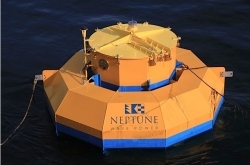Tests Reveal Consistent and Verifiable Power Generation
Portsmouth, NH, October 18, 2012 –(PR.com)– Neptune Wave Power, LLC has been running tests on Model 3.1 of their Wave Energy Conversion (WEC) device within the University of New Hampshire’s Center for Ocean Renewable Energy (‘CORE’) – with great results. The tests have proven the viability of Neptune’s technology in a repeatable manner – for the first time.
“Our goal is to deliver energy by creating the most robust, maintainable, and economic system possible,” said Steve Hench, Chief Scientist at Neptune Wave Power. “We are optimizing energy extraction from ocean waves through a tunable system that reacts to a wide range of sea states. The tests have been very positive.” Model 3.1 has definitively proven that Neptune’s technology can harvest wave energy and convert it into commercially viable electricity.
Both Model 3.0 and 3.1 buoys have been tested at the UNH CORE, with Model 3.1 showing significant improvements in the overall harvesting of energy from waves. The advances of Model 3.1, including a custom designed generator, scalable and mass producible hull design and a remote mechanical tuning feature has allowed Neptune to maximize the energy harvested. “The buoy is performing just as we modeled it,” said Eddie Mayfield, President, Neptune Wave Power. “We are very excited to obtain real-world validation of our work to date.”
About Neptune Wave Power
Neptune Wave Power has developed patented technology that will produce cost-effective commercial quantities of electric power using a generation system harnessing kinetic energy from ocean waves. The generation cost compares favorably not only with that of other generation systems such as wind power or alternative proposed wave energy capturing devices, but with many other conventional power sources as well. Neptune Wave Power is headquartered in Dallas, Texas. For more information, visit www.neptunewavepower.com.
About University of New Hampshire Center for Ocean Renewable Energy ‘CORE’
UNH’s CORE has expertise in ocean engineering, mooring design, device deployment and retrieval, and hydrodynamics modeling. In addition, CORE has many physical assets including two research vessels under the management of UNH, a dedicated dock and launching facility, several onsite mooring components and a wave rider buoy to collect environmental data for detailed site information.
Source: Neptune Wave Power, LLC




